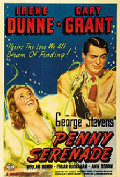
Directed by
George Stevens
125 minutes
Rated PG
Reviewed by
Bernard Hemingway

Penny Serenade
George Stevens is an undeservedly neglected Hollywood studio director who began his long film career as a cinematographer before becoming a director in the early 1930s and hitting his straps in the '50s although his most widely known film is probably the mid-60s sword-and-sandal epic,The Greatest Story Ever Told.
Stevens' work is marked by a strong interest in and commentary on the human condition. Penny Serenade is an early manifestation of his characteristic approach. Penned by Morrie Ryskind with Martha Cheavens, it is, as its opening scene tells us “the story of a happy marriage” although as we find out, not one without its sorrow. Cary Grant and Irene Dunne play the ordinary young couple, Roger and Julie Adams, who set out on life’s highway only to find that it is not all they dreamed of, Julie having a miscarriage as a result of an earthquake in Japan where they have gone for Roger’s job (the film was released in April 1941, eight months before Pearl Harbour) and later, their adopted child dying unexpectedly.
Told in a series of flashbacks based on songs in Julie’s album of 78s (the first one giving the film its title) the film is unabashed tear-jerker, and unduly drawn-out one at that, with Stevens holding some shots for, an excruciating period of time. Although the aim clearly was to mix comedy in with the tragedy, it is questionable if the ever-suave Grant who was nominated for an Oscar for his performance is the right man for the part of the devoted husband and father (he does a classic Grant comedic scene when he searches frantically for the adopted baby in the bedclothes) however Dunne in her third teaming with Grant after two straight comedies, The Awful Truth (1937) and My Favorite Wife (1940), in a more serious performance effectively offsets him with the film having an ambition and sincerity that merits attention.
Want something different?





